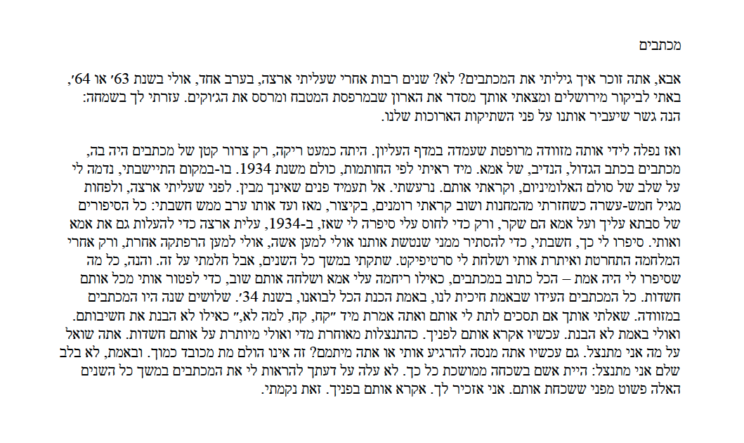Letters
Original by Dan Pagis
Translated, from the Hebrew, by Shoshana Olidort
Father, do you remember how I discovered the letters? No? Many years after I’d immigrated to Israel, one evening, perhaps in ’63 or ’64, I came for a visit from Jerusalem and I found you organizing the closet on the kitchen porch, spraying the roaches. I helped you, gladly: here was a bridge that could get us across our long silences.
And that’s when the tattered suitcase that had stood on the upper shelf fell into my hands. It was nearly empty, just a small parcel of letters inside, letters with mother’s big, generous handwriting. I saw immediately from the stamps that they were all from 1934. There, on the spot, I sat myself down on a rung of the aluminum ladder, I believe, and I read them. I was flustered. Don’t pretend that you don’t understand. Before I immigrated to Israel, at least from the age of fifteen, when I got back from the camps and started to read novels again, in short, from then until that very evening I really thought all the stories about you and mother that grandmother had told me were a lie, and that it was only in order to spare me that she had told me that when you immigrated to Israel in 1934 you had intended to send for mother and me. They told me this, I thought, in order to hide from me the fact that you had abandoned us, perhaps for another woman, perhaps for some other adventure, and only after the war you regretted it, and located me and sent me a certificate. I was silent about it all through the years, but I dreamt about it. But all that they had told me was true — it’s all in the letters, as if mother had taken pity on me and sent them again, in order to relieve me of all these suspicions. All the letters testified to the fact that you really did wait for us, that you really did prepare everything for our arrival in ’34. For thirty years, the letters were in the suitcase. I asked if you would agree to give them to me, and immediately you said, “take, take, why not,” as though you didn’t understand their importance. And maybe you really didn’t understand. Now I’ll read them to you. Like a belated, perhaps even superfluous apology for those suspicions. You ask what I’m apologizing for. Are you trying to calm me down, or are you just playing dumb? It doesn’t suit an honorable dead man like yourself. In truth, I’m not apologizing whole-heartedly: you were guilty of this prolonged forgetfulness. It didn’t occur to you to show me the letters all these years because you simply forgot them. I’ll remind you. I’ll read them to you. This is my revenge.
******
******
Translator’s Note: Many thanks to Jonathan Pagis for granting me permission to publish this translation, and to the Bialik Institute and Hakibbutz Hameuchad Publishing House. The original appears in DAN PAGIS: COLLECTED POEMS, Hakibbutz Hameuchad Publishing House and the Bialik Institute, Jerusalem, 1991, p. 358
*
Dan Pagis (1930-1986), was among the most important modern Hebrew poets of the postwar era, and a preeminent scholar of medieval Hebrew poetry. Born in Bukovina, Romania, Pagis survived the Holocaust as a child. “Letters” comes from “Abba,” a series of prose poems that Pagis, who died prematurely of cancer, did not get to complete during his lifetime. These poems are addressed to Pagis’s father, who immigrated to Palestine in 1934, with plans to send for his wife and young son soon afterwards, plans that were altered by the sudden, unexpected passing of Pagis’s mother. During World War II, Pagis was imprisoned in a Nazi concentration camp. In 1946, he arrived in Palestine, where he was reunited with his father, after more than a decade’s separation.
Shoshana Olidort is a writer, translator and scholar, and the web editor for the Poetry Foundation. She is completing a PhD in Comparative Literature at Stanford University.

